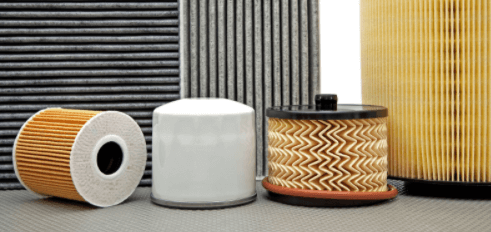If you have put more than a few thousand miles on your car, you undoubtedly know what an oil change is. Once upon a time, prevailing wisdom suggested an oil change every three thousand miles. Today, that number has changed. Manufacturer-suggested oil change intervals range from 5k to 7.5k miles, and longer if synthetic oil is used in place of conventional motor oil. What has not changed is the recommendation to replace the oil filter along with the oil. You probably knew that too. But did you know that other filters in your vehicle need changing too? Here is a description of five filters you should probably be familiar with.
Oil Filter
Okay, we already mentioned that the oil filter needs to be replaced whenever the oil is changed. Oil from inside the engine is routed to the oil filter and forced through by the oil pump. Inside the filter, dirt and debris (metal particles from wear to the engine components) are removed from the lubricant so it can cycle back through the engine. If contaminated oil is allowed to remain inside the engine, the tiny solid particles can cause premature wear and damage to engine components – bearings, pistons, valves, etc. – costing thousands of dollars. Have a quality filter installed whenever the oil is changed to help to reduce engine wear.
Engine Air Filter
Your car’s engine needs air to breath. Combustion requires a mixture of fuel and oxygen, so air has to enter the combustion chamber. The air filter traps dirt and debris entering the intake manifold so that foreign matter does not get inside the engine. It is not hard to notice that the environment has plenty of contaminants that could get sucked into the engine. And some surroundings are dirtier than others: dirt roads, desert highways, windy days. The more debris in the air, the faster the air filter gets clogged, and a clogged filter affects the way your engine performs. Making sure that the engine air filter is clean can prolong engine life, increase fuel economy, and reduce harmful emissions, while helping your engine to remain at peak performance levels. Replacement intervals run from 15k-30k miles, depending on the manufacturer.
Cabin Air Filter
Yes, your engine needs to breath. Of course, so do you. Many vehicle owners are completely unaware that the air that enters the passenger compartment through the vents, whether heated, cooled, or at outdoor temps, is filtered by a cabin air filter. Usually located ahead of the dashboard (“behind” the glove box), the cabin air filter is often neglected. But that filter (or pair of filters in some cases) is responsible for maintaining a clean environment inside the vehicle. Without regular filter changes, the performance of the heating and cooling system is compromised and the fan motor works harder. Foul odors can result too. If the inside of your car has a funny smell that will not go away no matter how many times you clean, have the cabin air filter checked. Like the engine air filter, the lifespan of this one is also affected by the driving environment. Look to have it changed every 20k-30k miles.
Transmission Oil Filter
Another neglected component is the transmission oil filter. Like the engine oil filter, the trans oil filter strains out any small, hard debris that can cause premature wear. Whether or not automatic transmission fluid (ATF) should be changed is a question a lot of drivers ask. Manufacturers say yes. Some recommend that the fluid be changed at 45k miles, others at 90k. Some repair shops suggest a fluid flush, where the new fluid is forced into the system to replace the old. Simply draining and filling the transmission does not replace all of the fluid; nearly half is retained inside the torque converter. Flushing replaces it all. If you opt for changing or you choose flushing, the transmission oil filter needs to be replaced.
Fuel Filter
The fuel you put into your car, truck, or SUV is not always pure, not always sediment-free. The fuel filter is in place to keep dirt and debris from getting into your fuel system. Dirty fuel can plug up fuel injectors and affect engine performance. And a clogged filter can cause the fuel pump to work extra hard to get fuel from the tank to the engine. If it gets clogged enough, fuel flow will be restricted and the car might not run. Besides a no-start condition, rough idle, lack of power, difficulty starting, and engine stalling are all symptoms of a fuel filter that has been neglected. Have it changed every 30k-60k miles.
Over time, manufacturer recommendations change, including service intervals for routine maintenance. What does not change is the need for maintenance. Refer to your vehicle owner’s manual – or talk to a trusted technician to find out what the maintenance schedule looks like for your car so you don’t neglect these five important filter changes.
Columbia Auto Care & Car Wash | Author: Mike Ales | Copyright
This article is intended only as a general guidance document and relying on its material is at your sole risk. By using this general guidance document, you agree to defend, indemnify and hold harmless Columbia Auto Care & Car Wash and its affiliates from and against any and all claims, damages, costs and expenses, including attorneys’ fees, arising from or related to your use of this guidance document. To the extent fully permissible under applicable law, Columbia Auto Care & Car Wash makes no representations or warranties of any kind, express or implied, as to the information, content, or materials included in this document. This reservation of rights is intended to be only as broad and inclusive as is permitted by the laws of your State of residence
